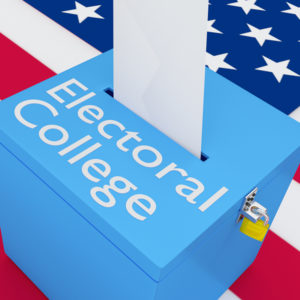On July 6, the U.S. Supreme Court ruled that states had the power to require presidential electors to vote for the presidential candidate they promised to vote for when they accepted the elector appointment.
The court held that, when the Constitution says: “Each state shall appoint, in such manner as the Legislature thereof may direct, a number of electors …” the Constitution means that appointments power “gives the States far-reaching authority over presidential electors, absent some other constitutional constraint.”
After the decision, conservative radio host Rush Limbaugh took to the airwaves and declared “this ruling was unanimous against advocates attempting to change the Electoral College and shift the country toward a nationwide popular voting system for the presidency.” And it failed miserably.
Of course, contrary to what Limbaugh says, the case had nothing to do with the National Popular Vote Interstate Compact, but it does have important holdings that could effect its constitutionality. Contrary to what Limbaugh says, those holdings strengthen the constitutionality of the compact.
Here are the four important things conservatives need to know about that decision:
— The decision held that the power of the legislature under Article II, Section 1 of the Constitution is “far reaching” and it conveys the “the broadest power of determination over who becomes an elector.” This is consistent with 130 years of Supreme Court jurisprudence.
— The court then recited the history of the Electoral College. From the first contested presidential election in this country, the court pointed out, electors committed to a candidate, and then voted for that candidate. Some conservatives have said that the Electoral College was supposed to be a deliberative body. Neither Thomas Jefferson nor John Adams thought that when they ran for president in 1796. In fact, they, and the states they were from, used the Article II, Section 1 power, to maximize their state’s interest in the outcome of the presidential election.
— The court then described the winner-take-all laws in the various states, and said the states had the right to require electors to follow those laws. It did NOT say that those were the only laws that states could enact. They simply said the states could ensure compliance with whatever laws they had.
— This is exactly what the National Popular Vote Interstate Compact does. We all know that the state-based winner-take-all laws make only about 12 “battleground” states relevant to the outcome of the election. That means 38 states have no meaningful input into who becomes president.
So, if you are a conservative, you should be worried about why Republicans campaign in Florida for free drugs for seniors (Medicare Part D), the largest entitlement program since welfare, or for No Child Left Behind in Ohio to win the votes of the mini-van driving soccer moms there, or ethanol mandates on gasoline to win Iowa, and ignore the rest of us.
Republican presidential candidates abandon conservative values to win battleground states, and that is what the compact will fix.
The Framers of the Constitution specifically left the state’s power to appoint electors “broad” and “far-reaching” because they thought a state should have the ability to change its appointment laws to maximize the state’s input into who becomes president.
The Framers would be spinning in their graves if they thought state legislators in 38 states would have a law that makes the concerns of the electorate in Florida, Ohio and Iowa the most important in the country. But that is what the “winner-take-all” laws do. The compact will restore the balance between the battleground and non-battleground states, just as the Framers intended.
Want the conservatives in the mountain states, the Midwest, and the South to matter? Or how about the conservatives in California, New York and Illinois? Make their votes relevant to the election. Make every state a battleground state and every voter a battleground voter.
The Framers expected that, by giving the states “broad” and “far-reaching” power, the states would change their laws when it was necessary to enhance the state’s interest in a presidential election. The compact is consistent with the Framers’ intent as recited in the Constitution, and with the states’ interest in becoming important to the presidential candidates.
And it does not abolish the Electoral College.
That is a win/win/win for the country, the Framers and the voters of this country.

